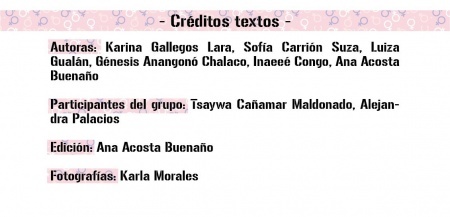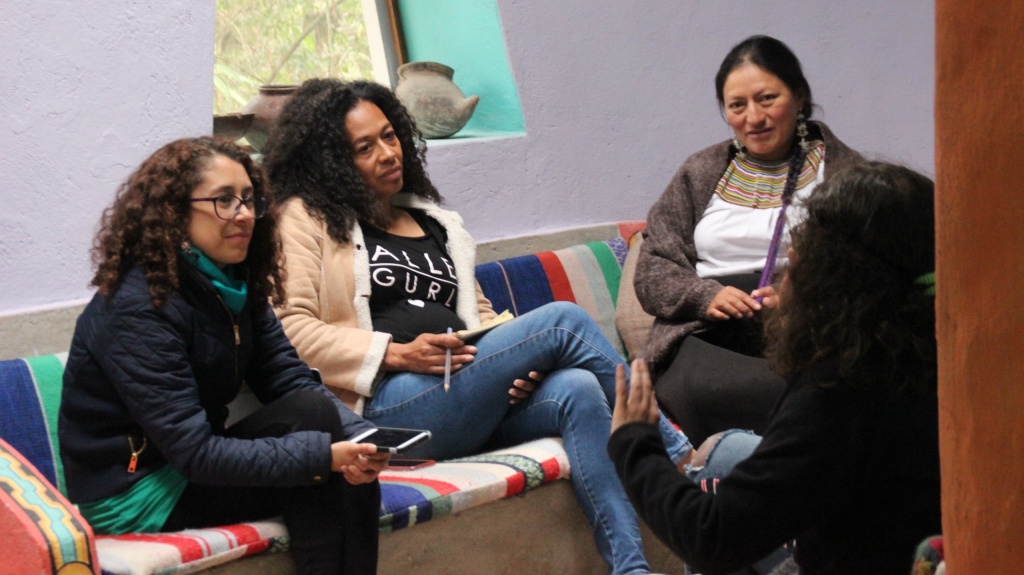
How did I Discover Myself to be a Feminist,
How did We Discover Ourselves to be Feminists?
By: Collective Text
For some, it is the memory of the women in our family; for others, it is feeling the weight of inequality associated with being a woman, even more so being a poor, black, indigenous woman. Yet for others, it is the physical abuse on our own bodies; or the desire to do something for other women and girls. For all of us, feminism is now a way of being and living, both personal and collective.
We are seven women with diverse origins, ideas, voices, senses, life lessons and experiences who came together to share how we discovered ourselves in feminism, or better said, in feminisms. Each of us wrote one text, and then read it to the group. As such, this is a collective work.
I Was a Feminist Without Knowing It
By: Karina Gallegos Lara
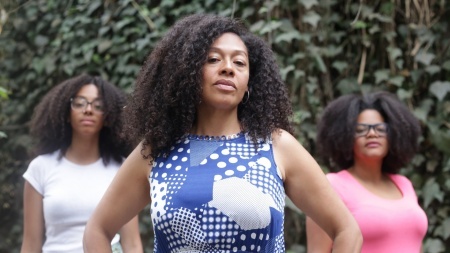
I was born in Quito, but I lived with my Grandma in the fields for a few years after birth. She lived north of the province Imbabura in the Caliche community, where my Mother’s side of the family is from.
I was born and grew up in the presence of a family led by women, which we could call matriarchal, where equality was the norm. I grew up seeing and experiencing traditions and ways of life that only now I realize are the lifestyles that the feminist movement is fighting for, so that all women can enjoy these rights. I had the opportunity to live and share my childhood and adolescence with ten aunts, who are proudly empowered black women, but who did not come from any sort of feminist background. For me, it was normal to hear things such as:
– Be careful not to let any man raise his voice at you! Poor little guy if he makes you feel bad and I find out!
These were words of warning, not for me, but rather for whichever man who dares to treat me bad.
From the women of my family, I have learned that we have the absolute power to make decisions about our lives and our bodies. The man, partner, husband is more like a companion. We act and we decide. I grew up with this mindset, this feeling, that this is the way things should be. I do not need to ask permission to do things, but rather I do them, and that is it. Currently, in this journey of life, by meeting with other strong and brave feminist communicators who are a part of Churo, Ojo Semilla, Wambra, and Afro Comunicaciones, I am rediscovering myself and understanding that I was already a feminist, but I did not know it.
When you turn on the television, read the newspapers, or listen to the neighbors, there are so many things about violence against women and girls; from inside I cannot understand it. It does not matter to me if these women are black, white, mestizo, girls, little girls, I know that violence is not good. I wanted to have the tools to help other women, so I began to read articles and get stronger in a group of feminist women.
Now I understand that there is not only one feminism, but rather, many feminisms, and I recognize myself as an intersectional feminist who believes that oppression against women is not only a result of gender, but rather, of many causes, such as class, ethnicity, sexuality, disability. Today, I say it with pride, in the same way that the women of my family taught me: I am a feminist.
Finding the Clues
By: Sofía Carrión Suza
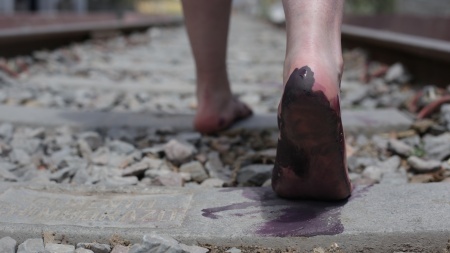
It happened without thinking about it, without defining it; so much so that I do not know when it began, but perhaps I can find some clues.
As a child, I did not understand my neighbors, a girl and boy who played pretend with the girl acting as the Mom and the boy as the Dad. I was even more confused when I saw him hit her, and then both say: “It is just a game”.
Then, I saw their Mom’s bruises and heard their Dad screaming, and from this experience, I felt the weight of inequality that comes with being a woman.
That girl next door was my first friend, we were six, we saw each other almost every day, until the day that my Mom told me:
–She is sick. Today you will not be able to play together.
So, time passed. I got used to not seeing my friend often, and the paths of life set distance between us. Many years later, reminiscing about my memories, my Mother told me that my friend had not had the flu as I had thought, but rather, she had been sexually abused and infected with a venereal disease. My Mom’s words left a deep hole in my heart.
For me, to be a woman implies to grow up with challenges, but also with fears and failures. To be a woman is to destroy and build. When what I thought was love came, I felt the pain of forgetting who I am. I had to hit rock bottom, to accept that something had died inside of me, to suffer and cry to finally heal, accepting that love begins first in oneself and should give you joy, health and peace.
This was what I found in feminism, just like in the stories of my friends, Mom and Grandma, even though they do not call themselves feminists, they live by it. I found a place where I understand myself and can understand what happens with other women and girls like my neighbor who could not continue being a girl due to the physical abuse. This is how I find myself in feminism, following the clues of those that preceded me, but also being the one who leaves clues for others to know that we are not alone, and that together we are more.
I Discovered the Feminism that Bore Me and Led Me to Celebrate Being Black
By: Génesis Anangonó Chalaco
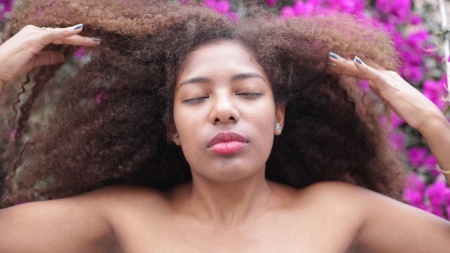
Being black was not my choice, and it was not good luck or a blessing either. Being black was the product of my genetic makeup, mixing of races, and my parent’s love –my Mother is mestizo and my Dad is black–. I do not have a problem with this color, or with white, or yellow or any color. I like my color and celebrate being black.
At 17, when I started studying journalism, I discovered feminism and class awareness; and thanks to this, I began to recognize myself as a black, feminist woman. For this reason, I always say that the best thing that journalism has given me is feminism. Thanks to this movement, I learned to accept myself as a strong and brave woman, capable of doing anything that I want, even if I am black and society does not believe I can.
When I discovered feminism, I realized that I was educated by a feminist. My Mom taught all of us to do the house chores –my brother, my sister and me. Similarly, she never stopped us from doing something because it was not for girls, and when my sister decided to study to be a mechanic, she took a deep breath and accepted it. Mom never believed that my sister or I should limit ourselves just because we are girls, nor did she prohibit us from wearing certain types of clothing because they were considered provocative. Mom talked to us about sex, contraception, and unwanted pregnancies; and she told us that we would not lose our dignity if we had sex, if the contraceptives did not work, or if we became mothers, with the desire to do so. My Mom is the first feminist I met, she is the reason and the cause for who I am now, and without even knowing it, she made me strong, she influenced me, and she made me a feminist.
I first considered myself a feminist when I accepted that my existence was not linked to being a housewife or a mother; when I learned that my existence in this world was due to a failure in the contraceptive, and that Mom –and Dad also– despite not having had good economic conditions, decided to give birth to me. She gave birth to me because she wanted to, because she could, and because she decided to do so; and ever since she learned of my existence, she has loved me. She loves me and that is why now she also calls herself a feminist, and together we deconstruct ourselves and accompany each other.
Feeling Supported on Women’s Shoulders
By: Luiza Gualán
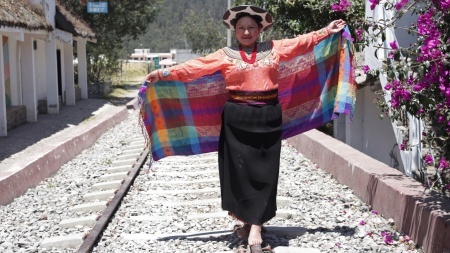
To feel the shoulders of women supporting other women is vital, it reminds me of an experience I had with hugs that helped lift me up from a critical state in which I had collapsed, as a consequence of repeating behaviors, customs, and prejudices of submission and violence. There has not been a group of men to support me in these conditions, but there have been women that believe it is possible to get me back on my feet with the desire to feel alive and let myself be helped.
I do not know how to decipher this, but I would summarize that the support between women is the motor. I like “Vivas nos Queremos” a lot because I want myself alive. Alive and in good footing. To hold onto life is to not accept and to break all the individual, social, political, and religious views, customs, and erroneous paradigms that say: «It is this way, it must be this way,» just because you are a woman. Today, this is what allows me to consider myself a feminist.
What awakened my feminism? Receiving the support of other women. I had a partial break down from too much suffering and disappointments, my body could not take it any longer, the doctors told me that I should be in a wheelchair. I wanted to study, but I could not do it. If I would have been able to study – I told my husband– I would be on a podium. Recently, I have been giving talks in front of many people, but I do not have a title. They ask: “¿What are you, an engineer, lawyer?”, and I reply: “I am Luisa.”
I do not want to tell my story of pain, I do not want to generate pity or compassion. I want my vindication experience to be motivational and a reference for other women who decide to free themselves. I want to maintain the expression of freedom. It is not the end of my story, it is the start of a new beginning. It is not a fictional story, it is real. Just as real as I am. To reiterate, I consider myself a feminist after having broken social paradigms, religious beliefs, customs normalized as cultural, and false concepts of what being a woman looks like.
Guilt and Pain, Never Again
By: Inaeeé Congo
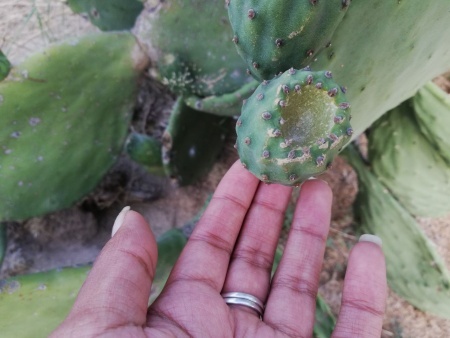
I discovered feminism at the end 2016, when I started a political formation school for women. At the beginning of that same year, I got into a toxic relationship, in which my partner dominated me and prohibited me from doing many things. That year, I also found out that I was pregnant, I was a month and a half pregnant. When I told this to my partner, he immediately let me know that he did not want to be a father. As I had my Mom and Dad’s support, I did not care about his opinion.
One weekend, my partner and I went to Quito and we decided to go dancing at a disco. In the disco, a friend from my community who I had known for a long time asked me to dance with him. I have always liked to have a good time and that does not mean that I am a bad woman. This action made my partner furious, he hit me while the assistants were watching, then he dragged me to the exterior of the disco and continued hitting me in the stomach, ribs, and belly. I do not remember anything, but people tell me that I managed to arrive at the house of some family members that live near the disco. They also remember that I was covered in blood and that the only thing that I asked was: ”Am I even still pregnant?”. And no, I was not pregnant anymore. He had hit me until he could not anymore. He broke one of my ribs and caused an abortion.
When I regained consciousness, I remember that I kept wondering if I was still pregnant, but nobody answered me. When my Mom arrived, covered in a sea of tears, she asked me:
–How can I help you?
I asked her if I was still pregnant and she told me that I was not. I cried and cried in front of my Mom’s inconsolable look and she repeated:
–How can I help you? I saw you be born, but I would not tolerate to see you die.
These words went to my heart and ever since that moment I do not cry. Sure, I get sad, but now I do not cry.
I thought that my family was going to turn their backs on me, but they did not. Everyone continued to be there to support me, except from one aunt, who I really appreciate but is too toxic. She blamed me for what he did to me, and she told my Mom and I that I was responsible for everything that happened to me:
–Mariana, your daughter is to blame for this. Your daughter brought upon herself what is happening to her.
She did not leave us in peace, and every now and again I started to believe her words. I came to feel disgusted with myself and I told myself that I was the one to blame for not behaving like a good woman.
I attended a women’s congress where I heard a beautiful and potent speech from one of the speakers. She said that no woman is guilty for the violence that they have faced. At that moment, feminism made sense in my life.
I had sworn to myself that tears would no longer flow from my eyes because my Dad had told me that I had to be strong and that crying was a sign of weakness, but I believe that when we cry, we get something off of our chest, and it is a sign of respect towards ourselves. I do not know if I will become a mother at some point, but if I come to be one, my baby will be welcomed. Day by day I can no longer be sad, I did not allow myself to drift away from others and be sad, that is, I do not want to see myself sad, nor do they.
For these reasons, I am feminist, from there stems that strong feminism within me. In the society I grew up in, the husband hits you in the morning, at night he goes to be with another woman, and he returns the next morning; and if you do not have things ready, he will hit you again. Also, inside the home, women work and provide, but the husband beats them and takes away half of what they earn from working. I became a feminist when I learned that many girls in my community of afro-descendants sleep with older men to be economically dependent on them. I became a feminist for all these adolescent mothers, who did not want or plan to be one. They do not offer education with a gender perspective at the schools in my community.
Now I consider myself a radical, crazy, feminist woman, as most people call us. I have provided accompaniment; I have spent my money and I have indebted myself to encourage other women to follow this process. The last girl that wanted help –but her mom would not let me– was raped by her father.
I am a feminist for all the violence, for everything that I have been through, for everything that women close to me have been through and, in the case of rural women, I believe that we suffer more violence than the women from the city.
The Memory of my Mom
By: Ana Acosta Buenaño
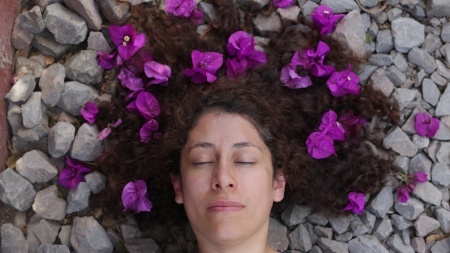
My Mom studied up until Secondary School. She did not go to college to look after -together with my grandparents and later with my father- the hardware store that has been my family’s source of income. My Mom never talked to me about feminism, but she told me many things that today I recognize as feminist.
She told me that when my grandparents told her that she should study at the nun’s boarding school, she stayed for a year and, on the first vacations where she came back home, she ran away. On the day that she should have returned to school, she hid where my grandpa –my great-grandfather– worked, up there in the field.
My Mom also told me that she almost died in the hospital. She had gone into labor; she was alone on a Sunday night. She felt a warm liquid slide down her legs. She was bleeding out and every time that she tried to move, she felt more and more blood come out. She rang the bell, but nobody answered. When the nurses arrived, they treated her badly, they blamed her for her own bleeding. After this, my Mom did not want to go into labor at the hospital, she gave birth to my sister and I with Rocío, an obstetrician-midwife, and accompanied by my aunt, in Sangoloquí, near the house.
Imagining her escaping on a horse and going to the field to escape the nun’s boarding school taught me that no one can make me do something that I do not want to do, something against my will; it taught me about consent and desire.
When she decided where and how to give birth, refusing to be treated violently in a cold and vacant hospital, she taught me that motherhood and childbirth is something very strong that I must decide, I must desire it to be able to live happily.
Today, my Mom is losing her memory. She has been to various doctors, some say that she has nothing, that it is natural for a 75 year old woman to forget some things. Others say that she has senile dementia, and that every day she will lose more of her memory, her ability, her independence, and her normal life. She will no longer remember. It is because of this that I write, to not forget what she taught me, because the things that my Mom did and told me gave me the guidelines for feminism that made me who I am, without even knowing that the word existed.
* Texts prepared in the writing group, Encuentro Ojo Semilla Feminista, Multimedia Edition prepared on September 23, 24, and 25, 2019 in Peguche, Imbabura. A space initiated by El Churo, Ojo Semilla and Wambra Medio Digital Comunitario.
